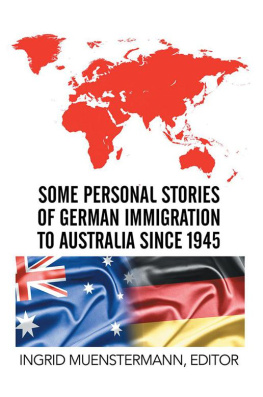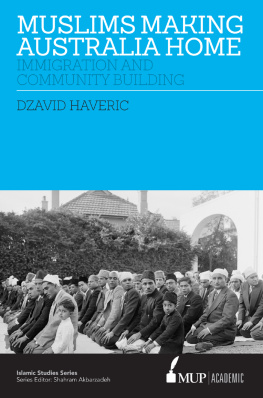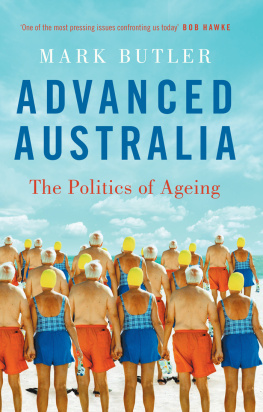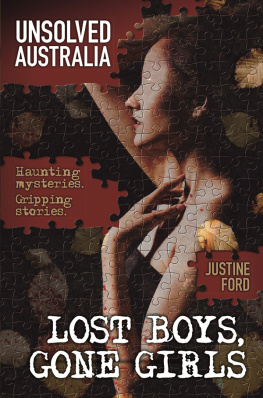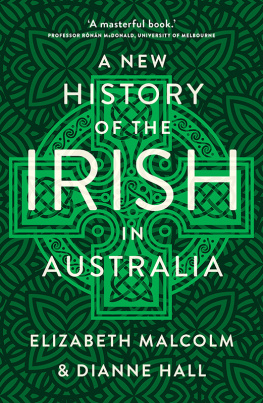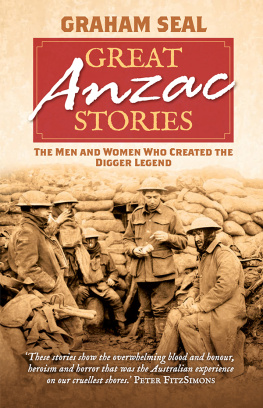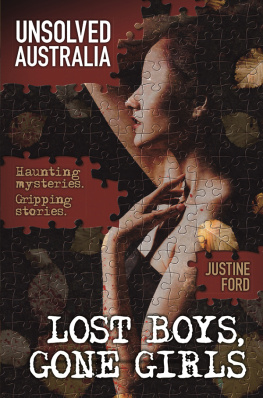SOME PERSONAL STORIES OF GERMAN IMMIGRATION TO AUSTRALIA SINCE 1945

INGRID MUENSTERMANN, EDITOR
Copyright 2015 by Ingrid Muenstermann.
Library of Congress Control Number: 2015902956
ISBN: Hardcover 978-1-5035-0314-4
Softcover 978-1-5035-0312-0
eBook 978-1-5035-0313-7
All rights reserved. No part of this book may be reproduced or transmitted in any form or by any means, electronic or mechanical, including photocopying, recording, or by any information storage and retrieval system, without permission in writing from the copyright owner.
Any people depicted in stock imagery provided by Thinkstock are models, and such images are being used for illustrative purposes only.
Certain stock imagery Thinkstock.
Rev. date: 05/28/2015
Xlibris
1-800-455-039
www.Xlibris.com.au
522041
Contents
This book is dedicated to my daughters, Iris and Isabel-Caroline.
With love - and I thank you for travelling with me!
I am gratefully acknowledging the contribution of the writers of different chapters. Thank you for your trust, input, and patience:
Gerd Aberle, Ilse Beckers, Horst Blaich, Oliver Burmeister, Ortrud Burmeister, Dagmar Carter, Herlinde Cayzer, Sigrid Erdt, Sabina Haut, Sigrid Hawker, Heiner Herbst, Anthony Kamphausen, Fred Kleitsch, Albert Koenig, Albert Loeffel, Teresa Marshall, Arno Meyer, Stefan Mueller, Katrin Ogilvy, Gisela Outrata, Beate Pasch, Hans Roleff, Helmut Ruff, Ernie Salomon, Rolf Schlagloth, Gundula Schuetze, Gerhard Schulz, Alfons Stuetz, Detlef Sulzer, Ariane Roncon, Irmline Veit-Brause, Walter Veit, Engelhard Weigl, Heinz Wendt, Nicola Wunderlich.
Some personal reflections
Ingrid Muenstermann
T his book has been in the making since late 2010. As circumstances changed, so did the title. At first, the title was meant to be Post World War II Germans in Australia: Hopes, Disappointments, Integration and Achievements . It changed to 201260 Years of German Immigration to Australia . Due to unforeseen circumstances, the publication was delayed; therefore, the introduction starts with an apology to everyone who had submitted according to schedule. Todays title is Personal Stories of German Immigration to Australia since 1945.
Why a book on German immigrants who arrived in Australia since 1945? Maybe it is time? There are many publications regarding the early settlement of Germans, especially in South Australia, some of which are mentioned below. What should make this book different is that it gives German immigrants from all walks of life a voice, showing that different periods of time and different Australian and German governments provided opportunities to people of various educational and professional backgrounds to settle in Australia. All stories convey a wish, a longing to improve their situation, but the accounts also show that these people were prepared to acculturate and contribute in a positive way to their adopted society. Have I caught all their voices? Hardly, I must agree with Stokvis who argues that
... One tries to catch reality in theoretical networks, but something always slips through the meshes. The catch offers at most a perspective on reality. If the meshes are too large or the fish too small, the net remains empty (Stokvis, 1979, cited in F. Luethke, 1989, p. 304).
This catch, i.e. the stories here presented, offer at most a perspective on reality. When Erich Nossack (2004) wrote The End: Hamburg 1943 . Schlink reasons that
... over the generations, collectively experienced historical events become individually varied memories. The task of dissociation from specific historical guilt leads to the creation of ones own identity, an undertaking that every generation has to master (p. 21).
He also finds that no judge can exempt, no verdict can free the children from their share of guilt formed as part of their parents bequeathal to them (p. 21). Some truly thought-provoking words. But the purpose of the book are the stories, positive and challenging, of other migrants and not my troubling thoughts in relation to Germanys past; people have come to Australia to start a new life, acknowledging the past but looking forward to the future. Let me then introduce myself before providing an introduction to the chapters.
I was born in Hamburg, hence the reference to Erich Nossacks book, and came to Australia in 1973 for the second time. The first time I arrived in 1959, but after two years, I left my husband with our two daughters and returned to Germany, functioning as a single parent and establishing myself in a secretarial career. After returning to Australia, my professional career is all-encompassing: cleaner, kitchen hand, office assistant, receptionist, secretary, and project officer. Flinders Medical Centre, where I worked as endocrine secretary, provided the opportunity to undertake academic studies (being so close to Flinders University), a chance which I appreciated greatly. It took six years to complete undergraduate studies and honours while full-time working. Flinders University then provided a scholarship to undertake a Ph.D which was conferred in 1997. Here I have to mention gratefully Prof Robert Holton, my PhD supervisor, for providing the chance of a lifetime.
When I arrived in Australia with my thirteen- and sixteen-year-old daughters, I was divorced and very grateful for the opportunity to return to this country. Since I did not want to start our new life being a burden to society, i.e. receive a supporting mothers benefit, I worked long hours, and my teenage daughters were left to their own devices, which had some damaging consequences. If one could only turn the clock back.
There is an interesting little story to tell regarding me being divorced. Our well-meaning ledger machinist at Hillcrest Psychiatric Hospital, where I started my working career in Adelaide, recommended, Why dont you say you are a widow? Dont tell people that you are divorced! This indicates the attitude of Australia and its people at that point in time in relation to divorce (it was 1973!). Believing to have shown courage to leave a marriage that did not function and to take full responsibility for my children, I was adamant not to lie. Having lived in this country now for forty years, I like to acknowledge that Australia has offered me some great opportunities. I have met a few unpleasant people, so settling into a different culture and later on establishing and maintaining a professional career was not always easy, but I have also met many wonderful people, of different nationalities, whose wisdom, genuine friendship, care, and compassion will always remind me that despite some broken dreams, life in Australia has been rewarding. I am grateful that friendships have developed and lasted for decades.
Completing my personal reflections, I feel that it is not only important to acknowledge the possibilities Australia offered to new settlers but also that it is crucial to admit that sacrifices were made. When I wrote letters to people who may be interested in contributing to this book , I asked prospective participants to write about their experiences of coming to Australia about the challenges and also about positive happenings. I believe that the book has achieved this goal. In twenty-nine chapters, Germany-born women and men provide accounts of their immigrant experiences; some are short and look more like a bibliography, or like a business report, some people have told a story, and other contributions are based on research in the humanities. The text tries to maintain authenticity. The English language may not always be perfect; however this is part of the appeal I believe. The educational backgrounds of the newcomers are very different.
Next page
